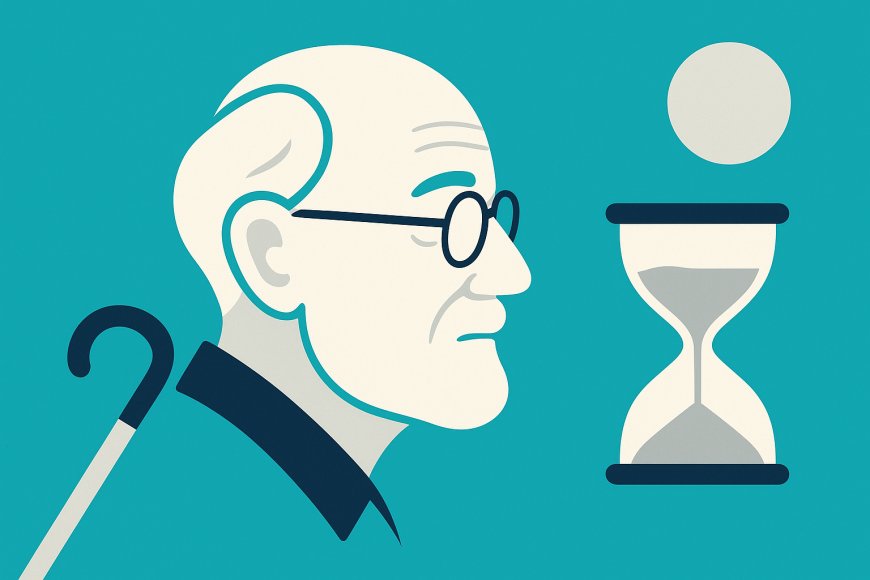Beyond Longevity: A National Study Reveals the True Health of Saudi Arabia's Elderly
A landmark study on aging in Saudi Arabia paints a detailed picture of the health challenges facing the country's older population. The research reveals high rates of chronic diseases, poor lifestyle habits, and significant mental health risks, highlighting the urgent need for a shift towards comprehensive, preventative healthcare.

Aging is a natural biological process characterized by a gradual decline in the efficiency of the body's systems and vital functions, including the nervous, cardiovascular, and immune systems. This incremental decay heightens susceptibility to chronic afflictions such as heart disease, diabetes, and Alzheimer's, and raises mortality rates with advancing age. With the global rise in life expectancy, the challenge is no longer merely to prolong life's years, but to focus on enhancing the Healthspan? the number of years a person lives in good health and vigor, free from debilitating diseases or chronic infirmities.
According to the estimations of the World Health Organization, the world has witnessed a remarkable rise in average life expectancy over recent decades, creating a growing challenge for healthcare systems and national economies. This reality has compelled developed nations, such as the United States, Japan, and the European Union, to direct colossal investments toward research on aging and its associated sciences, known as Geroscience. This inquiry is not confined to the biological causes of aging; it extends to the development of pharmaceutical interventions and biological technologies that aim to retard the decay of organs and extend the healthy lifespan of individuals. In this sphere, colossal global initiatives have emerged, a confluence of academic and investment interests, such as the patronage of biotech firms working to develop drugs that target the pathways of cellular senescence, including therapies for the removal of senescent cells (Senolytics) and the modification of metabolic pathways such as mTOR. Global markets have also begun to treat aging research as a promising economic sector, valued in the billions of dollars annually, attracting great investors who seek to lead a field expected to alter the standards of public health in the coming decades.
The Saudi Pursuit of Aging Research
In the global trend toward promoting a healthy lifespan, the Kingdom of Saudi Arabia has taken strategic strides to reinforce its leading position in this nascent sector, in concordance with Saudi Vision 2030 and the objectives of the Health Sector Transformation Program. The Kingdom has witnessed a significant increase in average life expectancy, from approximately 46 years in the 1960s to about 76 years in 2020, a testament to the notable improvements in healthcare services and societal awareness. Among the most prominent national initiatives in this field is the launch of the Hevolution Foundation, a non-profit organization dedicated to funding scientific research and technological applications that aim to extend the healthy lifespan and delay the onset of age-related diseases. Hevolution is an initiative supported by the Saudi Public Investment Fund (PIF), and the foundation has allocated annual funding of up to one billion dollars to support groundbreaking research and innovative projects around the world in the fields of geroscience and related biomedicine. Hevolution focuses on supporting pioneering research projects, both through academic grants for local and international researchers and through investments in companies specializing in anti-aging technologies. The foundation also aims to ensure that future treatments are accessible to a wider segment of the world's population, including developing nations, and to enhance the research infrastructure locally to support scientific innovation in the Kingdom. This trajectory positions the Kingdom as a pivotal player in a growing global landscape that seeks to transform aging research from an academic pursuit into practical applications that have a direct influence on public health and the quality of life.
The State of Aging in the Kingdom
Aging is a natural phase in the course of a man life, yet its details and the health and behavioral challenges it presents differ from one society and environment to another. In the Kingdom of Saudi Arabia, a research team led by Dr. Nasser Bin Duhaim has cast a light upon this stage of life through a comprehensive descriptive study targeted individuals aged 60 and above, with the aim of grasping the reality of aging and its health and behavioral indicators in Saudi society more closely to the authentic, daily existence of its people. This study was distinguished by its communal nature, where it encompassed a broad sample of 2,702 participants of both sexes, distributed across various regions of the Kingdom. It was not confined to patients or those who frequented hospitals and health centers, as is common in clinical studies, but instead focused on relatively healthy individuals from the community, which grants its findings a singular value, as they paint a realistic portrait of the condition of the elderly, far removed from the biases of clinical samples.
The Burden of Chronic Diseases and Health Challenges
When one scrutinizes the health aspect of the elderly included in the study, a complex picture unfolds, reflecting the entanglement of several chronic diseases that accompany the advance of years. It was revealed that nearly half of the participants (44.7%) contend with one of the most common chronic ailments - high blood pressure or type 2 diabetes while the rate of those afflicted with high blood cholesterol rose to 59.5%, a figure that reflects the health burden that accompanies modern lifestyles and the march of time. The matter did not cease there, as the results showed that more than half of the participants (52%) suffer from at least two chronic diseases, while nearly a third (32.1%) deal with three or more chronic diseases simultaneously, these are figures that plainly reveal the compounded challenges this age group may face in their daily lives. Heart diseases were also present in 19.2% of the participants, while chronic respiratory diseases were recorded at 12%, completing a portrait of aging and the physical burdens it carries, which require close monitoring and comprehensive health management.
Mental Health: The Unseen Side of the Equation
The study was not limited to measuring physical indicators; it also extended to cast light upon the psychological aspect, which is at times less evident but no less vital than the physical. The results showed that nearly 17.7% of the elderly are at risk of depression or anxiety, a proportion that awakens us to the reality that aging is not merely a physical challenge tied to chronic diseases; it is also a phase in which mental health may be impacted by multiple factors, including feelings of isolation, limited mobility, or the loss of accustomed social roles. These findings make it clear that the care for the elderly must be comprehensive, integrating medical, psychological, and social aspects in concert.
Health Behaviors and Lifestyles
When one turns to lifestyles and health behaviors, the study reveals a reality that asserts itself with great force: the vast majority of participants (88.9%) do not consume sufficient quantities of fruits and vegetables, an indicator of the poor quality of their daily diet. Only 20.1% met the recommended requirements for physical activity, reflecting a lifestyle largely dominated by a lack of movement, which is a key factor in increasing the risk of chronic diseases. With such a lack of commitment to these healthy behaviors, it was not surprising that the study revealed a widespread prevalence of obesity and overweight; 30.7% suffer from obesity and 36.4% from being overweight. This means that about two-thirds of the elderly in the Kingdom are over their normal weight, which places an additional burden on the heart and joints and increases the likelihood of future health complications. Smoking also remained a present force in the lives of some participants; as 11.1% admitted to smoking cigarettes daily, while 5.8% used hookah regularly and 5% electronic cigarettes, which indicates the continued presence of behaviors that may increase health risks for this age group.
The Overall Picture and Its Implications
When these findings are assembled into a single picture, we discover that aging in Saudi society is associated with an intricate web of health, psychological, and behavioral challenges, where many of the elderly contend with multiple chronic diseases amidst a weak commitment to healthy lifestyles?be it in terms of nutrition, physical activity, or abstaining from smoking?with a not-insignificant segment exposed to psychological risks that may escalate if they are not given sufficient attention. This picture places upon us a great responsibility to design awareness programs and preventive initiatives that transcend the purely therapeutic aspect to include the promotion of healthy behaviors, the support of mental health, and the empowerment of the elderly to adopt lifestyles that guarantee them a better quality of life in this crucial stage of existence.
Conclusion
The data presented paints a clear picture: as Saudi Arabia's population ages, the nation faces a complex set of interconnected challenges. The study by Dr. Nasser Bin Duhaim and his team highlights that many older Saudis grapple with multiple chronic diseases, often compounded by unhealthy lifestyle choices and a significant risk of mental health issues. This reality underscores the urgent need for a shift in focus—from simply treating existing illnesses to proactively promoting a comprehensive, holistic approach to healthy aging.
By aligning with the global geroscience trend and initiatives like the Hevolution Foundation, Saudi Arabia is strategically positioned to become a leader in this field. However, to truly succeed, efforts must extend beyond grand-scale scientific research and investment. The findings from this study show that the most impactful changes will come from local, community-based programs that encourage healthy diets, regular physical activity, and strong social and psychological support systems. By addressing these fundamental behavioral and mental health factors, the Kingdom can ensure that its citizens not only live longer, but also enjoy a higher quality of life, transforming the challenge of an aging population into an opportunity to build a healthier and more vibrant society for all.
What's Your Reaction?












































































































